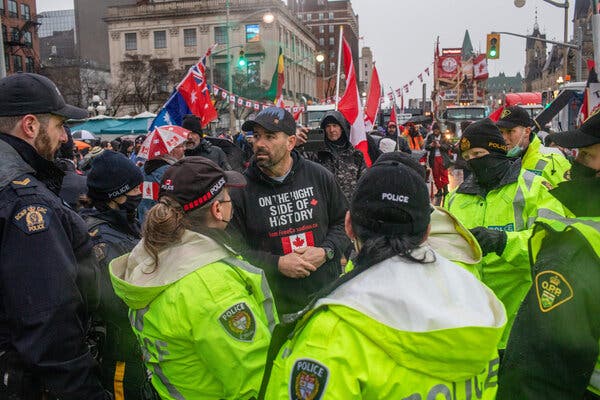
The police have begun moving in to make some arrests in downtown Ottawa, hoping to end weeks of gridlock in Canada’s capital from demonstrations sparked by vaccination requirements and other grievances.
Among those arrested Thursday night was Tamara Lich, 47, one of the protests’ main organizers, according to Dagny Pawlak, a spokeswoman for the protest.
Ms. Pawlak called the arrest “absolutely baseless and a disgrace to any liberal democracy, although not a surprise.”
Ms. Lich has emerged as the public face and the most visible leader of the trucker convoy against pandemic restrictions. She is a former fitness instructor, who has worked in the energy sector and sung and played guitar in a band called “Blind Monday” in Medicine Hat, Alberta. She was also a senior member of a splinter party that advocated for Canada’s Western provinces to secede from the country.
Throughout the protests, Ms. Lich, who speaks publicly in measured tones, has become adept at deploying social media — and her Twitter feed — to amplify the protesters’ grievances.
The police also arrested another organizer, Chris Barber, on Thursday afternoon, a spokesman for the protest confirmed.
Officials had been signaling for days that what had been criticized as a sluggish law enforcement response would soon be ending, and on Thursday, city, provincial and national police mobilized around Ottawa in preparation for a clampdown. Officers were seen gathering at a convention center near the airport and at major hotels on the city’s perimeter.
“The action is imminent,” Steve Bell, interim chief of the Ottawa Police Service, said Thursday afternoon, adding that the police were committed to ending the “unlawful occupation.”
The police created a perimeter with about 100 checkpoints in Ottawa’s downtown core on Thursday, to keep anyone but residents from entering, and declared the downtown a secure zone closed to outsiders.
Officials also closed all exits leading to the city center on the Trans-Canada Highway, which is Ottawa’s crosstown expressway. By Thursday evening, there was widespread gridlock through several neighborhoods in the inner parts of the city.
On Parliament Hill, the sleeting rain that had drenched Ottawa much of the day turned to snow, and defiant protesters remained in the streets, some of them dancing. One group of demonstrators followed a news camera crew, yelling, “Are you proud of what you’re doing?”
Just after 8 p.m., a yellow Volvo semi-truck voluntarily departed from Confederation Square — which surrounds the National War Memorial — after the police approached the driver. As the trucker opened his door for the last time before leaving, protesters shouted messages of gratitude to him while scolding the police.
The demonstrators said they had received text message alerts with the location of the police who were confronting the driver to try to intercede. It was the second truck in the area to leave Thursday.
The police issued increasingly urgent warnings on Wednesday and through the day Thursday — posted online, on social media and in printed leaflets distributed by hand to the protesters — stating that the blockade of streets was illegal. They threatened the protesters with arrest, seizure of their vehicles and other penalties.
In a sign of intensifying frustration over the protests, on Thursday the scope of a class-action lawsuit against the protesters was expanded to include more workers and businesses whose livelihoods have been upended by the protests. In total, the lawsuit is seeking about 306 million Canadian dollars in compensation for lost income.
In recent weeks, truckers and their supporters blocked key border crossings and other routes, impeding commerce and idling automakers’ plants. Some blockaded streets and harassed residents in Ottawa, creating a round-the-clock cacophony in quiet residential neighborhoods. While many of the demonstrators are from fringe groups, others are people who are fed up with pandemic restrictions. Physical violence has been rare.
Ottawa residents and many Canadians have grown impatient with the sluggishness of the police response, and early this week Ottawa’s police chief resigned amid criticism of law enforcement.
Prime Minister Justin Trudeau took the rare step this week of declaring a national public order emergency — the first such declaration in half a century — to end the protests. The move extended more robust policing measures across the country, and took aim at both protesters’ fund-raising, which has been deemed a criminal activity, and the demonstrators’ personal and business bank accounts.
Addressing the House of Commons on Thursday, Mr. Trudeau called for the protesters to go home. “It is high time that these illegal and dangerous activities stop, including here in Ottawa,” he said.




